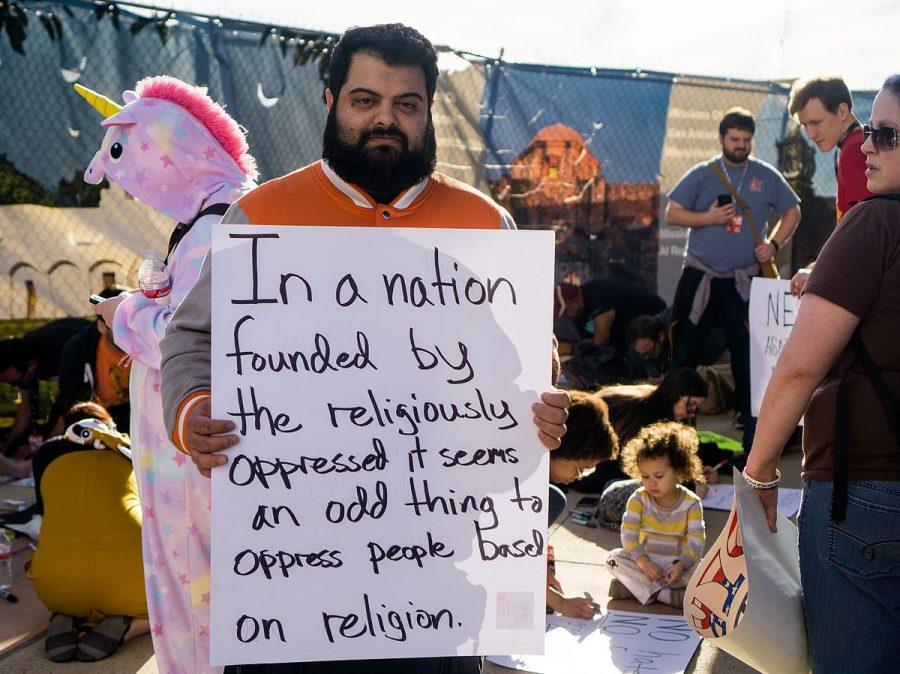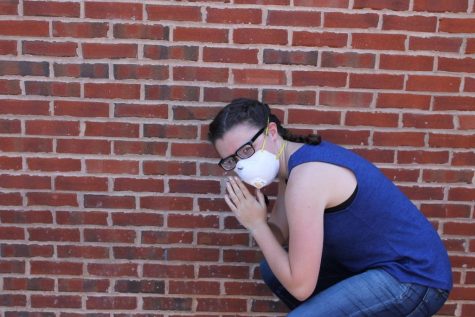Students respond to Trump’s executive travel ban
Photo Credit: Daniel Cuadra
Protest from Pax South attendees following President Trump’s executive order to decrease access to healthcare and a travel ban on seven Muslim-majority nations.
February 14, 2017
President Donald Trump signed an executive order that created extreme vetting measures and detention for both green card holders reentering the country and visitors from seven countries, while totally cutting off the country to Syrian refugees.
President Trump’s executive order applies to Iraq, Libya, Somalia, Sudan, Syria, Iran and Yemen. It gives border patrol agents the right to detain any green card holders from applying countries for questioning for as long as needed.
This immigration ban has been dubbed a “muslim ban” by liberal protesters because of the concentration of muslims in each of these countries. Protests of this order have taken place in international airports all over the country involving public prayer, “We are all muslims now” signs, and support from non-muslim American citizens.
Matt Lacognata is a liberal senior who has protested Trump in the past. “I am in full support of those who protest for what they believe in. The amount of support the country has given towards not only Muslims, but all marginalized groups affected since his inauguration has been amazing,” Lacognata said.
Since 9/11, there has only been one terrorist attack committed by a person from any of these countries. In 2006, a naturalized US citizen from Iran rammed nine people with a car at UNC. The victims each suffered minor injuries.
Dean Eleftheriades is a conservative senior who is vocal about his support for Trump.
“Those seven countries haven’t done a lot of violence against the United States currently, but you have to remember the people that reside in those countries. Recently there have been large spikes in the popularization of Sharia Law in them because of destabilization due to economic differences between them,” Eleftheriades said.
Sharia Law is an Islamic tradition of lawmaking that has been criticized by western cultures for sexism and unnecessary brutality.
Eleftheriades compared this safeguard to wearing a bulletproof vest. “You’re just protecting yourself, it’s only temporary, and this ban will soon be lifted,” Eleftheriades said.
Iraq, Libya, Somalia, Sudan, Syria, Iran and Yemen have all been targeted by this order because of an investigation by the Department of Homeland Security run by the Obama administration in 2015. Because of this, Trump supporters have criticized the term “muslim ban”.
Alex Aronson, a senior, is a right leaning moderate. “Calling it a muslim ban kinda reinforces the rhetoric that Trump is so anti-muslim, and it’s like directly targeting these minorities,” Aronson said.
Many liberals like Lacognata view the ban as “useless and rooted in islamophobia.”
While those on the conservative side endorse the added safety that such a ban could bring.
“In this situation, I believe that the suspension of immigration rights in this country is one of the better things that we could do to guarantee the safety of the American people,” Eleftheriades said. “It will be okay.”
Both sides agree that now is the time for unity of the country. Everyone is the same in how desperate they feel, but each viewpoint differs in how they are choosing to handle their fear and uncertainty.
“Times are very turbulent and I feel we have never been more divided. This is just a time where people need to come together. While I may disagree with Trump supporters politically, I just want to see a future where people can get along and not only settle our differences but celebrate them as well,” Lacognata said.




